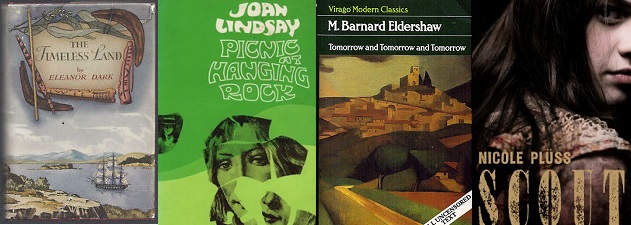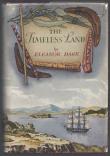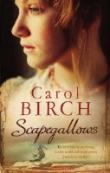AustLit
-
16 Jul 2015(Display Format : Landscape)
Aust. Historical Fiction: A Crowd-sourced List
In our proud tradition of having crowd-sourced a couple of other reading lists (namely Australian YA fiction and Australian romance novels), we now bring you our crowd-sourced list of Australian historical fiction.
-
 This image has been sourced from online.2500767750840839275.jpg
This image has been sourced from online.2500767750840839275.jpg
 This image has been sourced from online.5636572668077526412.jpg
This image has been sourced from online.5636572668077526412.jpg
 Image courtesy of Penguin Books Australia1549097974792768160.jpg
Image courtesy of Penguin Books Australia1549097974792768160.jpg
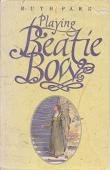 This image has been sourced from online.4544435785273587186.jpg
This image has been sourced from online.4544435785273587186.jpg
 This image has been sourced from online.4796788794080948320.jpg
This image has been sourced from online.4796788794080948320.jpg
 Image courtesy of Penguin Books Australia5382868810518598882.jpg
Image courtesy of Penguin Books Australia5382868810518598882.jpg Playing Beatie Bow Ruth Park , 1980 single work novel
Playing Beatie Bow Ruth Park , 1980 single work novelNo sooner had we asked people to nominate their favourite Australian historical novel than someone asked if Playing Beatie Bow counts. And it does! Many an Australian child has come to Sydney history via Ruth Park's surprisingly eerie novel.
Playing Beatie Bow also unwittingly set the mood for this list. As you'll see, the suggested works are heavily weighted towards women writers and works with a supernatural bent.
-
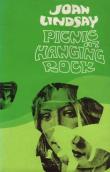 This image has been sourced from online.2221798898811365861.png
This image has been sourced from online.2221798898811365861.png
 This image has been sourced from online.8904867474543782760.png
This image has been sourced from online.8904867474543782760.png
 This image has been sourced from online.4252313708466249356.jpg
This image has been sourced from online.4252313708466249356.jpg
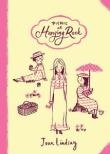 Image courtesy of Penguin Books2451937109971219799.jpg
Image courtesy of Penguin Books2451937109971219799.jpg
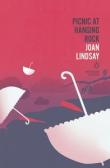 Cover image courtesy of publisher.6179407750872617367.jpg
Cover image courtesy of publisher.6179407750872617367.jpg
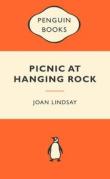 Cover image courtesy of publisher.6241838756100286429.jpg
Cover image courtesy of publisher.6241838756100286429.jpg
 This image has been sourced from online.7476862765095770400.jpg
This image has been sourced from online.7476862765095770400.jpg
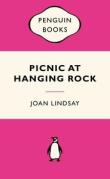 Cover image courtesy of publisher.4577548656075940128.jpg
Cover image courtesy of publisher.4577548656075940128.jpg
 Image courtesy of publisher's website.3775030314838225601.jpg
Image courtesy of publisher's website.3775030314838225601.jpg Picnic at Hanging Rock Joan Lindsay , 1967 single work novel
Picnic at Hanging Rock Joan Lindsay , 1967 single work novelAnother text by a woman writer, and another historical novel with a strong supernatural flavour, Joan Lindsay's novel has fascinated readers for decades, as well as inspiring an almost-as-beloved film adaptation.
-
Written by the partnership of Marjorie Barnard and Flora Eldershaw, Tomorrow and Tomorrow and Tomorrow is set in future Australia, where a 24th-century author is writing a novel set in 20th-century Sydney. The novel was heavily censored on first publication in 1947 (including an adjustment to the original title), and not published in its original form until 1983, when Virago brought out a complete edition.
-
Perhaps the best known of her works, Eleanor Dark's Timeless Land trilogy delineates the early years of the British colony in New South Wales, from the arrival in 1788 to the opening up of lands beyond the Blue Mountains. Unlike many historical novels of the period, Dark carved out a place in her narrative for the women who accompanied the settlers and for the local population with whom the settlers clashed.
-
 Cover for the first edition (Heinemann, 1995).7735157287559860689.jpg
Cover for the first edition (Heinemann, 1995).7735157287559860689.jpg The Potato Factory Bryce Courtenay , 1995 single work novel
The Potato Factory Bryce Courtenay , 1995 single work novelDespite the plethora of women on this list, we weren't the slightest bit surprised when Bryce Courtenay made his appearance. Perhaps the best-selling Australian historical novelist of the 1990s, Courtenay's work is deeply loved by his fans, and this novel spawned that most Australian of tributes: a television mini-series.
-
 This image has been sourced from online.2018222368897707415.jpg
This image has been sourced from online.2018222368897707415.jpg All the Rivers Run Nancy Cato , 1958 single work novel
All the Rivers Run Nancy Cato , 1958 single work novelSpeaking of historical novels that spawned television mini-series, there'll be many an Australian who remembers this novel through the sweeping adaptation, starring Sigrid Thornton and John Waters. But readers hold a soft spot for the novel, which is the first in a series of three.
-
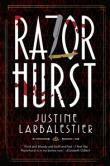 Cover image courtesy of Allen & Unwin.9073204644082774171.jpg
Cover image courtesy of Allen & Unwin.9073204644082774171.jpg
 This image has been sourced from online.9101425297038650738.jpg
This image has been sourced from online.9101425297038650738.jpg
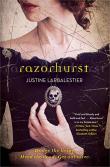 This image has been sourced from online.758532883199565657.jpg
This image has been sourced from online.758532883199565657.jpg Razorhurst Justine Larbalestier , 2014 single work novel
Razorhurst Justine Larbalestier , 2014 single work novelRazorhurst has now appeared on two of our three crowd-sourced lists of favourite books, and no wonder: eerie, rich, and bloody, the novel captures a period of Australian history that is often overlooked in favour of earlier decades.
Larbalestier dedicates the book to her predecessors, Ruth Park and Kylie Tennant, only one of whom, surprisingly, also makes this list.
-
 Image courtesy of publisher's website.225115552269811111.jpg
Image courtesy of publisher's website.225115552269811111.jpg
 This image has been sourced from online.6587685218897997446.jpg
This image has been sourced from online.6587685218897997446.jpg
 Image courtesy of publisher's website.4173718994030024521.jpg
Image courtesy of publisher's website.4173718994030024521.jpg
 7628334135084447098.jpg
7628334135084447098.jpg
 6654466297410939762.jpg
6654466297410939762.jpg
 839881719312859956.jpg
839881719312859956.jpg
 6790177349207503455.jpg
6790177349207503455.jpg
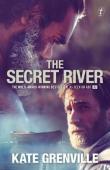 Image courtesy of publisher's website.939162831828705494.jpg
Image courtesy of publisher's website.939162831828705494.jpg
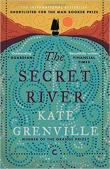 Image courtesy of publisher's website.6946511526653998237.jpg
Image courtesy of publisher's website.6946511526653998237.jpg The Secret River Kate Grenville , 2005 single work novel
The Secret River Kate Grenville , 2005 single work novelAdmit it: you're not surprised to see Grenville's novel make this list. From an award-winning novel to an award-winning play to what will likely be an award-winning television adaptation, The Secret River is one of the most prominent historical novels of recent years.
-
 Cover image courtesy the publisher.4235538972912765439.jpg
Cover image courtesy the publisher.4235538972912765439.jpg
 This image has been sourced from online.124065660128083717.jpg
This image has been sourced from online.124065660128083717.jpg
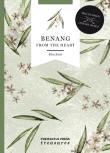 Image courtesy of publisher's website.5808940828954044135.jpg
Image courtesy of publisher's website.5808940828954044135.jpg
 Image courtesy of publisher's website.4316401369249798209.jpg
Image courtesy of publisher's website.4316401369249798209.jpg Benang : From the Heart Kim Scott , 1999 single work novel
Benang : From the Heart Kim Scott , 1999 single work novelFramed in the narrative of a young man piecing his familial and cultural history together from fragments of courses, Benang tells the story of the long history of the Noongar, inhabitants of the south-west corner of Western Australia.
Fittingly, the novel won Kim Scott his first Miles Franklin Award (which he shared with Thea Astley's Drylands).
-
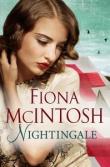 Cover image courtesy of publisher.2589052826718926783.jpg
Cover image courtesy of publisher.2589052826718926783.jpg
 Cover image courtesy of publisher.7932273705371234593.jpg
Cover image courtesy of publisher.7932273705371234593.jpg Nightingale Fiona McIntosh , 2014 single work novel
Nightingale Fiona McIntosh , 2014 single work novelFiona McIntosh also appeared on our crowd-sourced list of your favourite romance novelists, but this time the emphasis is on Nightingale–and aptly, because this is a novel of Gallipoli and its consequences, and what better year to be reading about that moment in Australian history?
-
 Image courtesy of publisher's website.6087947324238156774.jpg
Image courtesy of publisher's website.6087947324238156774.jpg The Brewer's Tale Karen Brooks , 2014 single work novel
The Brewer's Tale Karen Brooks , 2014 single work novelUnlike most of the novels on the list, this is not a novel of Australian history, but of Europe, with a Dutch protagonist who flees to London when her dreams of self-sufficiency come with a terrible price. Karen Brooks has been making a name for herself as a fantasy novelist, and she puts those skills to good use here–after all, what is our past but an alien culture?
(And the novel's focus on beer makes it utterly Australian.)
-
As scholarly bibliographers, we despair at a title like N: so difficult to search for among the tens of thousands of works on this database. But as readers, what's not to love? Another novel with a fantasy tinge, this is a historical novel of an Australian history that never actually existed–but could have, had we followed a different route.
-
Scapegallows: one of those words that is so rich and mysterious that it takes you a moment to twig to the brutality of which it speaks. And for many white Australians, there are scapegallows in the family tree: convicts who escaped execution only to be transported to what was the far side of the world, to become some of the first white settlers in Australia.
In this instance, Scapegallows tells the story of Margaret Catchpole, one of Australia's most written-about convicts, beginning with an 1845 novel.
-
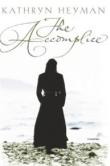 This image has been sourced from online3328886971100567460.jpg
This image has been sourced from online3328886971100567460.jpg
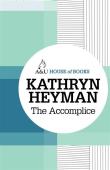 This image has been sourced from online4621394033811172308.jpg
This image has been sourced from online4621394033811172308.jpg The Accomplice Kathryn Heyman , 2003 single work novel
The Accomplice Kathryn Heyman , 2003 single work novelSpeaking of some of the murky elements of Australian history, meet the Batavia. Before the first convicts were sent to Australian shores, the Batavia, a Dutch ship, wrecked on Morning Reef near Beacon Island, off the coast of Western Australia. Many survived to make their way ashore on an island with no fresh water and few other sources of food–which is when the real horror of the Batavia shipwreck began.
This is only one of many historical novels about the Batavia. To check out some of the others, follow this link.
-
 Image courtesy of publisher's website.2015827036919584506.jpg
Image courtesy of publisher's website.2015827036919584506.jpg Scout Nicole Plüss , 2010 single work novel
Scout Nicole Plüss , 2010 single work novelA young-adult novel, Scout follows Kit Lovell as she travels from England to Australia, where her widowed mother is to marry a lighthouse keeper on remote Kangaroo Island. Nicole Plüss has published a number of other young-adult novels, often with a strong focus on the sea, but this is her only historical novel so far.
-

